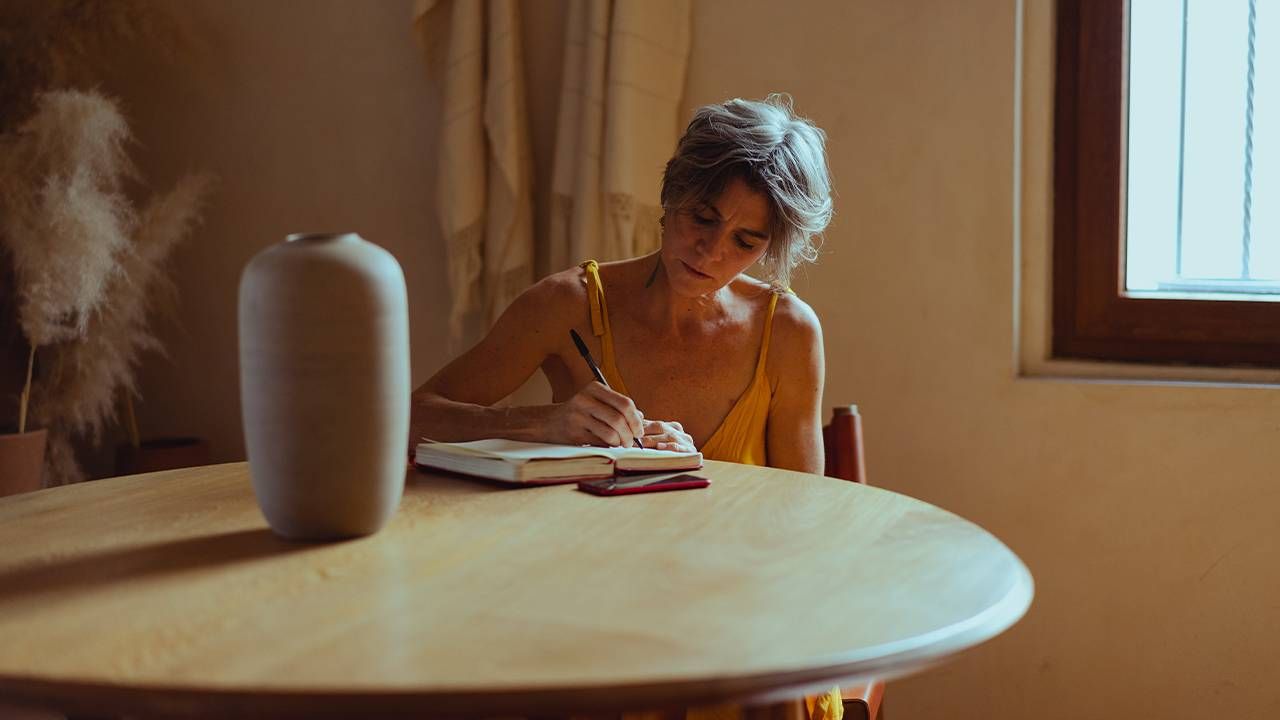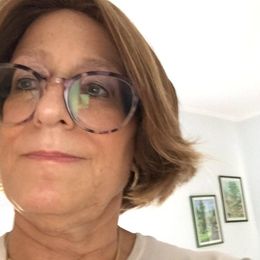What Should I Do With My Diaries?
I'm wondering how I can preserve my old journals, or even if I should
Casting a glance at the large pile of hardback notebooks lying alongside my sweater collection, my daughter said, "When you're gone, I'll throw these out."
I'm sure that she didn't mean badly, but her words felt like a slash to my heart.

Those notebooks contain thirty-two years worth of journals started when my daughter was still in diapers. I was a young mom, often lonely and confused. Writing brought me comfort and companionship.
Was I delusional to think that someday a future child, grandchild or stranger might wade through miles of my chicken scratch penmanship? Probably.
I wrote everywhere; at bus stops, in doctors' waiting rooms, and at the playground as my toddlers tunneled in the sand. I've written through births, miscarriages, moves, children's weddings, a child's divorce, the arrival of grandchildren, and the death of my parents.
I don't reread — once a notebook is done, it's stored. I feel deep ownership of my notebooks. They are an appendage, a piece of my soul, yet my daughter had a point. If I didn't use them, then why keep them?
Was I delusional to think that someday a future child, grandchild or stranger might wade through miles of my chicken scratch penmanship? Probably. Outside of the personal writings of world leaders or celebrities, most journals find their way into the landfill.
Some Say to Throw Diaries Out
Was this like wrinkles and a sore back — yet another indignity of aging I needed to accept? Was there another solution?
"Throw them out. They aren't precious," Natalie Goldberg, the author and writing guru wrote in an email. Her 1987 classic "Writing Down the Bones" kicked off my writing journey.
At first, I was shocked, but then I remembered that Goldberg practices Zen Buddhism, which is about detachment from the physical world, including notebooks. I don't.
Then I discovered that Goldberg (and my daughter) are not the only ones to give this advice.
Journal destruction has been going on for centuries, including by famous writers. Charles Dickens tossed 10,000 of his own pages into a bonfire. Poet Philip Larkin's mistress did his shredding for him. Franz Kafka ordered his diaries to be destroyed, but his executor failed to fulfill his dying wish.
Was I wrong in being so resistant? Wasn't it kinder to save my daughter the chore by doing the trashing myself?
"I've heard many stories from clients who kept a secret diary that was found and that was devastating," said James Pennebaker, psychologist and professor at the University of Texas at Austin whose experiments demonstrated the efficacy of journaling as a stress reducer.
Shredding the Evidence
Pennebaker had a point. I would not want my journals to hurt my loved ones.
Were my journals the last word on me? Were my journals even an accurate reflection of my most authentic self? Maybe not.
"I usually write (in my journal) when I'm miserable," said Pennebaker. "Fortunately, I'm not miserable often." That was true of my journaling practice as well.
After rereading the journals she'd kept since middle school, Brooklyn-based writer and artist Alyssa Ettinger shredded them all.
"I didn't like who I was reading. She was the worst version of me," said Ettinger, who called the act "freeing."
Similarly, a fear of being misunderstood and leaving a trail of pain led psychologist and musician Beth Falk of Mt. Kisco, New York, to destroy large chunks of her diaries. But instead of wholesale destruction, Falk curated the diaries, shredding some pages but preserving others.
"If I died tomorrow, my daughter would know many things about me, but it would all be okay," Falk said.
Falk's path felt wise — saving the memories while expunging the hurt. I was so hungry for memories because none of my ancestors left any; not my grandmothers who met their end in Auschwitz, nor my survivor parents.
A few months ago, I dusted off my first notebook dated November 1990. How odd it was to meet this earlier me. Yet reading her proved difficult — first the handwriting and then the tedium, long pages of kvetching relieved by the occasional humorous rhyme.
After a while, I quit. Would I return to this task? Maybe. Meanwhile, the question remained of what to do with my vast journal collection.
Maybe the solution is to keep them whole, but leave them in the possession of someone who could view them but wouldn't suffer from their contents.
That was Fort Collins, Colorado, bookstore owner and diary enthusiast Cynthia Manuel's solution.
"I don't want my family to have them because I don't always say nice things about them," said Manuel.
Instead, she's leaving them to a close friend, diary collector Sally MacNamara Ivey, whose TEDx talk "What I've Learned After Reading over 10,000 Diaries" has garnered close to a quarter of a million views.
Actor, fifth-generation Puerto Rican and shaman, Lisann Valentin, who has journaled since childhood reached the opposite conclusion. Her journals will go to her sister.
"I pray they stay within the family. The ink, the tears, the stroke of the pen all tell the story of a life unfolding," said Valentin.
That made sense but would my sons share my daughter's view? Maybe, but maybe not.
Our Personal Histories
"Kids are often very happy to have diaries," said Alexandra Johnson, author of "Leaving a Trace: On Keeping a Journal," who has devoted a great deal of her career to studying journals.
When Johnson inherited her aunt's journals, she felt that she had received a precious gift. "You want to know someone better than you knew them before," she said.
No, I couldn't destroy them. They held my story, and they were also part of history. Or were they? Was I flattering myself by imagining some future historian taking an interest in three-plus decades of my often-jumbled thoughts? Maybe not.
"I pray they stay within the family. The ink, the tears, the stroke of the pen all tell the story of a life unfolding."
When longtime diarist Lori Livingston learned of the absence of personal accounts from the 1918 pandemic, she began to record her COVID-19 pandemic life. Now she'd like to donate all of her writings to a historical society. Her Kitchener, Ontario, society is interested, but only in the volumes that reflect her life in Kitchener.
"I lived a good deal of my life in other places," said Livingston. She doesn't want to see her journals split up and thinking about it, neither did I.
Fortunately, one can have one's cake and eat it too — meaning keeping the set of journals intact without burdening heirs by placing them in a diary archive, a museum specifically for diaries and other personal writing.
Sending My Journals to London
Though there's one in Tuscany, Italy, the most extensive and best-known archive is London's Great Diary Project archive, founded in 2007 by British Museum curator and philologist (someone who studies the history of languages) Dr. Irving Finkel, together with Dr. Polly North. It is North who indexes the diaries, making them available to scholars and the public.
Finkel had never journaled himself or taken any interest in the subject until an antiques dealer offered to sell him a life's worth of diaries written by a retired British army officer. On a whim, Finkel purchased them all and began to read.
"I was captivated," he said. "Here was a well-educated person's entire life, a full page of writing a day from age nine until he died at a very ancient age." That experience made Finkel realize that personal writing required protection.
"Diaries are very vulnerable," Finkel continued. "A diary can be two to three feet long for a whole lifetime. If you live in a flat with no bookshelves, it's natural that a diary written by a dead person will go to perdition."
Thus far, the archive housed in London's Bishopsgate Institute has rescued over 15,000 unpublished diaries written worldwide. Anyone can deposit their journals — an entire collection or even a single volume in the archive. For those fearful for their privacy, there's an option to seal them for as long as the donor would like.
Cynthia Manuel and Sally MacNamara Ivey want to establish a diary archive in the U.S., but until that time, the Great Diary Project archive feels like the right choice.
So what's next? Preservation, ensuring that my journals are in a dry place, and making my wishes known by writing them down and filing that statement alongside my will and durable power of attorney. Then my journals will escape the dumpster and become part of history.
If she changes her mind, my daughter can read my words in London.


